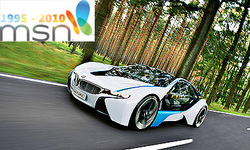 BMW Rapid change is one of the defining features of the car industry we know and love. For more than one hundred years, manufacturers have been battling tooth and nail to build bigger, better, cleverer and faster cars that will out-class rivals and part the motorists from their cash. There's no suggestion that this lightening pace of change is going to change anytime soon. Over the 15 years that MSN has been covering the car industry, the speed at which our cars have developed has been clear for all to see. Drive any model hailing from 1995 and it will feel decidedly dated next to a modern equivalent. That's virtually certain, but what about the differences between the cars we drive now and the ones we will be driving in another 15 years' time? Without a functioning crystal ball, or a DeLorean with the time machine option fitted, seeing into the future is an inexact science. That's not to say we can't have a stab at it though. Here are some of the areas where the car of 2025 is likely to be rather different. 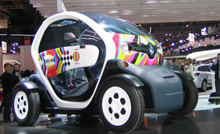 Microsoft They'll be greener The motoring agenda has been dominated by all things green over the last few years and there's little sign of the environmental focus abating as we stride forward. The motor industry was rather unfairly cast in the role of eco-enemy a few years back but it's reacted in fine style, slashing vehicle emissions in the short term and investing heavily in alternative fuel technologies for the future. As government legislation controlling pollution from cars tightens and we all fall under growing financial and social pressure to shrink our carbon footprints, the attraction of green cars looks certain to grow. In the first instance, we can expect continuing improvement in the internal combustion engine technology that's powered motorcars since the beginning. Advanced fuel injection systems, variable geometry turbochargers and clever engine management software have boosted the efficiency of petrol and diesel engines and should continue to do so. The alternatives to fossil fuels are also expected to experience a period of growth in the next 15 years or so. We already have hybrid cars but they look like becoming more common and better. Hybrids that can run solely on electric power for long periods are in the pipeline as are 'range-extender' models that use a petrol engine to charge batteries, which then power the electric motors that drive the wheels. Fully electric cars are also on the rise. You can buy models like the Nissan LEAF now but they're sure to become cheaper in the future, even if limited range is likely to restrict their use to urban areas. If improvements in battery technology extend the range of electric cars and the power storage capacity of hybrids, sales could really take off. Hydrogen fuel cell cars have often been touted as a magic bullet for the car's environmental problems but affordable production cars are still some way off. Many manufacturers are conducting trials of working prototypes out on the roads and some are predicting production versions within the next 10 years but major infrastructure investment will be needed for the hydrogen economy to take off. 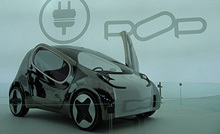 Microsoft They'll be lighter Less weight is very desirable in cars. It means less energy is needed to move them around and brings advantages in terms of performance, efficiency and manoeuvrability. For most of the last 15 years, cars have been getting larger and heavier but more recently, we've seen manufacturers starting to put a check on this weight gain. The majority of modern cars are still made of steel but the lightweight properties of aluminium are being employed more regularly on premium models. Plastics, carbonfibre and composite materials are also likely to play a bigger role in the future. Lightweight technologies are a beacon of hope for anyone afraid that the drive to produce greener cars is going to spell the end for thrilling high-performance models. Sports car manufacturers like Ferrari, Lotus and McLaren are at the forefront of developing techniques to minimise weight. It's a way for them to use smaller, greener engines while improving performance and handling. In short, everybody wins. 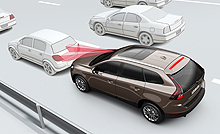 They'll be safer New cars today are safer than they've ever been. You can't by a modern car that isn't loaded with active safety systems to help prevent a crash and passive safety technologies to minimise the danger should one occur. In the future, it seems likely that our cars will continue to push the boundaries but drivers may need to get used to handing over some elements of control. Autonomous vehicle technology is big news in the car industry at the moment. We already have radar-guided cruise control, self-parking systems and technology like Volvo's City Safety that can detect an imminent collision and apply the brakes to avoid it. Much more is possible too but there's concern amongst the major manufacturers over how much control motorists will be willing to hand over to their cars. Would you feel comfortable reading the paper in the back seat while your car drove you to work? 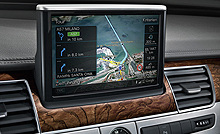 They'll be cleverer It sometimes seems as though the internet has quietly crept its way into all areas of modern life and it'll be playing an increasingly important role inside our cars in the future. The latest Audi A8 luxury saloon can be specified as a mobile wireless internet hot spot that provides internet access for its occupants and even people who happen to be walking by. More interesting though, are the advantages that the online cars of the future will be able to bring. By connecting with the web, vehicle satellite navigation systems will be able to direct us to free parking spaces or charging points for electric vehicles. There are also systems in development that will let cars communicate with each other, warning of accidents or congestion on our routes. By connecting to our vehicles manufacturers may be able to detect mechanical problems before they materialise or recommend personalised driving tips to enhance fuel economy. We'll also be able to download music and video content direct to our cars from our home computers or third party websites. 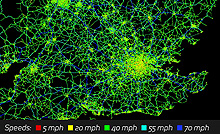 They'll be monitored The changes that affect drivers in the UK over the next 15 years look like materialising outside the car as much as inside it. The number of cars on the road looks set to carry on rising and we can expect to be more closely monitored than ever before when we drive them. It's a safe bet that some form of road charging will extend beyond the current enclaves of the London Congestion Charge zone and the M6 Toll road. That means more cameras or other means of surveillance. Black boxes inside cars that relay information about when, where and how fast you're driving are nothing new. Car security companies like Cobra and Tracker use the technology to monitor their customers' vehicles and it's been trialled by insurance firms who offer reduced premiums to motorists who agree only to drive limited distances or at less risky times. Tracking systems could also be an alternative to cameras when enforcing variable or average speed limits. There is, however, likely to be a groundswell of public opinion against increased surveillance on the roads. Via MSN Autos Click here to view the current inventory of new Chevrolet vehicles at Courtesy Chevrolet in San Diego.
0 Comments
Your comment will be posted after it is approved.
Leave a Reply. |
Welcome to the Courtesy Chevrolet blog – your place for Chevrolet news and reviews. Brought to you by Courtesy Chevrolet.
Website: CourtesySanDiego.com Phone: (619) 373-1641 LocationClick map to enlarge
Centrally located at 750 Camino Del Rio, North San Diego, CA 92108 Click here for our hours Find Us On FacebookFollow Courtesy Chevrolet on TwitterRead Our DealerRater Customer Reviews
Archives
March 2024
Categories
All
Produced by 72 Advertising
|
Courtesy Chevrolet. Centrally located at 750 Camino Del Rio, North San Diego, CA 92108


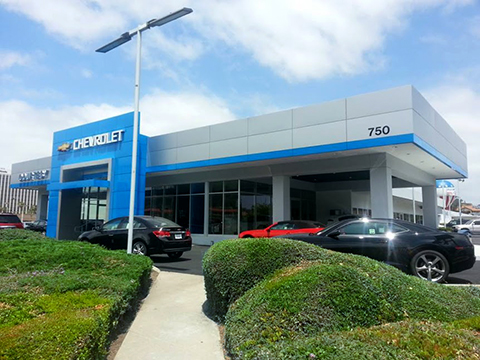




 RSS Feed
RSS Feed